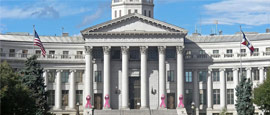Denver History
Denver was built on the fortunes of gold and the railroads. In the summer of 1858, a small group of prospectors made a significant gold discovery at the base of the Rocky Mountains.
The mere whisper of the word was enough to attract thousands to the banks of the South Platte River in search of the precious metal.
While the ‘Pikes Peak or Bust’ gold rush was in full force, General William Larimer laid out a city and, in hopes of gaining political favour, named the city after Kansas territorial governor James Denver.
It became the capital of Colorado in 1867.
When a gold strike was discovered in nearby Central City, Denver became a near ghost town. It soon bounced back, however, and began to grow as a trade centre. In following years, Denver fought off a Texan Confederate army, experienced a great fire, endured a flash flood, and saw an Indian war cut off their food supply lines.
While these hardships were challenging, the citizens were determined for their city to survive. When the Union Pacific Railroad evaded Denver, the citizens raised enough money to build a railroad that would meet the Union Pacific in Cheyenne, Wyoming. The city’s display of perseverance was rewarded when the Kansas Pacific Railroad was built crossing the plains to Denver. Not much later, a silver strike made Denver a boomtown once again.
It was not until 1953, with the construction of the first skyscrapers, that Denver began to transform from cow town to vibrant modern city.
Did you know?
• Denver's most famous beer, Coors, was originally brewed with Rocky Mountain water - a recipe that exists to this day.
• Titanic survivor, Margaret Molly Brown, made her fortune on Denver's gold rush and became known as 'Unsinkable Molly".
• In 1902, police at Denver Union Station banned kissing on the platforms because it was delaying the trains.
Do you have any Feedback about this page?
© 2026 Columbus Travel Media Ltd. All rights reserved. No part of this site may be reproduced without our written permission, click here for information on Columbus Content Solutions.




 You know where
You know where